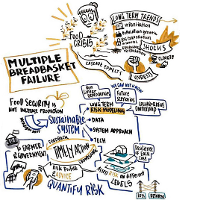MBBF
Increasing trade flows and trade networks make the global food system more vulnerable to systemic disruption. Climate shocks and consequent crop failure in one of the cereal breadbaskets might have knock-on effects on the global agricultural market. The turbulence's are exacerbated if more than one of the main crop producing regions suffers from losses simultaneously. A better understanding of risks of multiple breadbasket failures as well as improved modelling are needed in order to manage climate risks and an increasing global food demand.
Of special interest are effects of production shocks on crop prices and on agricultural commodity markets. Due to increased demand and limited production capabilities, the volatility associated with
agricultural prices is expected to rise in the next decades. Besides weather induced production shocks, energy shocks, increased energy demand and exchange rate markets, as well as fiscal and monetary expansions play a key role in this process.
The Multiple Breadbasket Failure Initiative (MBBF) brings together expertise of scientists in the Ecosystem Services and Management and Risk and Resilience groups. It analyses how chronic stressors and long-term trends together with acute shocks can impact agricultural production and lead to potential social, political and economic knock-on effects. Main MBBF drivers such as population growth, urbanization or changing consumption patterns due to increasing affluence are analyzed. Additionally, current and future climate impacts on the food system such as rising temperatures, extreme weather events such as droughts, floods or hurricanes are quantified using climate projections, IIASA’s crop model EPIC and various statistical methods. For the work on commodity price fluctuations, vector-autoregression models are used. Agent-based models are used to simulate potential spillover effects of a MBBF such as migration. And finally, advanced catastrophe modelling approaches taking increasing dependencies explicitly into account, e.g. through copula approaches, are employed.
MBBF contributes to the paradigm shift away from food security defined as solely high production or an optimized value chain toward food security as building locally or regionally resilient food systems in long term balance with human needs related to health and wellbeing and with sustainable resource use.
MBBF is a part of IIASA’s engagement in KSS (Knowledge Systems for Sustainability, https://jahnresearchgroup.cals.wisc.edu/research-2/kss/), a formal alliance of major research organizations selected to cover the intersections of energy, water, food and human security linked to a wide variety of private-sector players and public agencies.


related links


